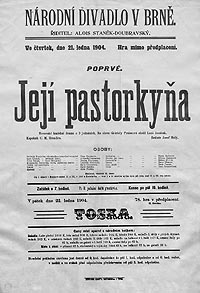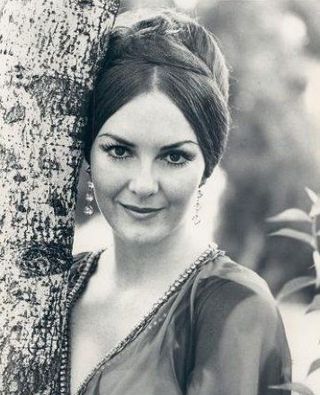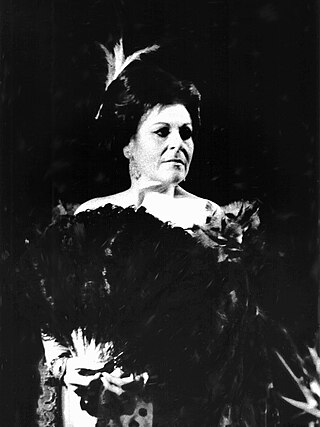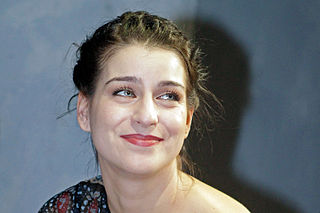
Její pastorkyňa ) is an opera in three acts by Leoš Janáček to a Czech libretto by the composer, based on the play Její pastorkyňa by Gabriela Preissová. It was first performed at the National Theatre, Brno on 21 January 1904. Composed between 1896 and 1902, it is among the first operas written in prose.

Leopoldine Rysanek was an Austrian dramatic soprano.

Anja Silja Regina Langwagen is a German soprano singer.

Reri Grist is an American coloratura soprano, one of the pioneer African-American singers to enjoy a major international career in opera.

Karan Armstrong was an American operatic soprano, who was celebrated as a singing actress. After winning the Metropolitan Opera National Council Auditions in 1966, she was given small roles at the Metropolitan Opera, and appeared in leading roles at the New York City Opera from 1969, including Conceptión in Ravel's L'heure espagnol, Blonde in Mozart's Die Entführung aus dem Serail, and the title roles in Verdi's La traviata, Offenbach's La belle Hélène and Puccini's La fanciulla del West. After she performed in Europe from 1974, first as Micaëla in Bizet's Carmen, and then as a sensational Salome at the Opéra du Rhin, she enjoyed a career at major opera houses, appearing in several opera recordings and films. Armstrong was for decades a leading soprano at the Deutsche Oper Berlin, where her husband Götz Friedrich was director. She appeared in world premieres, including Gottfried von Einem's Jesu Hochzeit, Luciano Berio's Un re in ascolto and York Höller's Der Meister und Margarita. She was awarded the title Kammersängerin twice.
Mary Elizabeth Mills is an American opera singer.

Naděžda Kniplová was a Czech operatic soprano who had an active international career from the 1950s through the 1980s. Kniplová possessed a large voice with a sonorous, metallic, dark timbre that was particularly well suited to the dramatic soprano repertoire. While she was most admired in Czech operas and as Wagnerian heroines, she sang a wide repertoire that also encompassed Italian, Russian, and Hungarian language roles. A fine actress, her performances were praised for their intensity and pathos. However, some critics commented on a certain lack of steadiness or purity in her singing. Her voice is preserved on a number of recordings made on the Supraphon and Decca labels.

Štefan Margita is a Slovak opera singer who has had an active international career since 1981. He began his career singing mostly roles from the lyric tenor repertoire but in recent years he has tackled a number of dramatic tenor roles. His career has taken him to the stages of many of the world's best opera houses, including La Scala, the Royal Opera, London, the Deutsche Oper Berlin, the Liceu, and the Opéra Bastille. Margita has had his debut performance at the Metropolitan Opera in November 2009 as Luka Kuzmič in Leoš Janáček's From the House of the Dead.

Eva Urbanová is a Czech operatic soprano who has had an active international career since 1987. She has been a principal artist at the National Theatre in Prague since 1990 and has appeared as a guest artist at many of the world's best opera houses, including La Scala in Milan and the Metropolitan Opera in New York City. She has made several recording on the Supraphon music label and was honored with a Thalia Award in 1993. In 2003 she was presented with the Ordre des Arts et des Lettres by the Government of France.

Dagmar Pecková is a Czech operatic mezzo-soprano.

Milada Šubrtová was a Czech operatic soprano who had a lengthy career at the National Theatre in Prague from 1948 through 1991. She was part of an instrumental group of the post-World War II Czech opera singers that was responsible for popularizing Czech opera internationally. She drew particular acclaim for her portrayals of the title heroines in Leoš Janáček's Jenůfa and Antonín Dvořák's Rusalka. Her voice is preserved on a few complete opera recordings made on the Supraphon label. In 1998 she was honored with a Thalia Award.

Libuše Domanínská was a Czech classical soprano who had a career in concert and opera from the 1940s through the 1970s. She was a leading member of the Brno National Theatre and later the Prague National Theatre where she sang a repertoire of 50 roles, especially as Janáček's Jenůfa, Káťa Kabanová and The Cunning Little Vixen. She was instrumental in making the composer's operas known internationally, both in recordings and guest appearances.
June Card is an American soprano and stage director who had an active career in operas and concerts from 1959 through today. She began her career as a chorus girl on Broadway before moving into opera.
Marina Domashenko is a Russian operatic mezzo-soprano.
Margarethe Bence was an American opera singer, who sang both mezzo-soprano and contralto parts and was mostly active in German and Austria, including international festivals such as the Bayreuth Festival and the Salzburg Festival. Her repertoire included music from Baroque to contemporary premieres.

Eva Randová is a Czech operatic mezzo-soprano who made an international career based in Germany. She appeared at major opera houses including the Metropolitan Opera, and at festivals such as the Bayreuth Festival. She is known for performing Czech operas by Leoš Janáček and Antonín Dvořák.

Asmik Grigorian is a Lithuanian operatic soprano of Armenian ancestry.
Sigrid Kehl is a German operatic soprano and mezzo-soprano.
Karine Babajanyan is an Armenian operatic soprano.

Elena Tsallagova is a Russian operatic soprano who has performed at major opera houses and festivals in Europe. She was noticed internationally as Nanetta in Verdi's Falstaff at the Glyndebourne Festival, and in the title role of Janáček's The Cunning Little Vixen at the Paris Opera. She has been a member of Deutsche Oper Berlin since 2013, performing lead roles such as Debussy's Mélisande, Gilda in Verdi's Rigoletto and Sophie in Der Rosenkavalier by Richard Strauss.


















